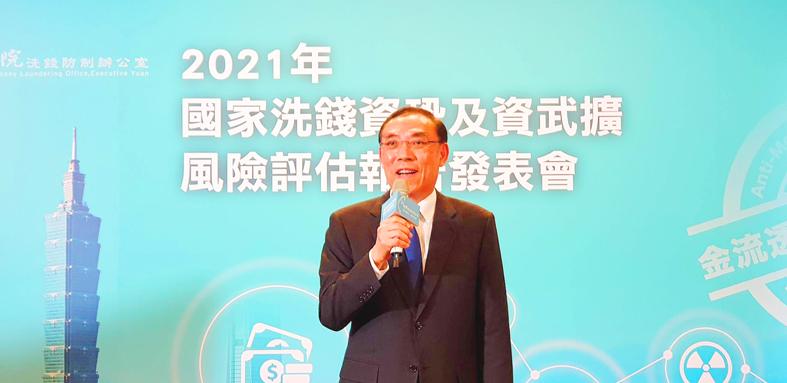Officials from Executive Yuan agencies, the Ministry of Justice and other ministries yesterday released this year’s report on Taiwan’s efforts to combat money laundering and terrorism financing.
Forty-seven government departments and regulatory agencies, and 27 private-sector organizations, mainly in the financial services sector, were involved in compiling data for the 2021 National Money Laundering, TF (Terrorism Financing), PF (Proliferation Financing) Risk Assessment Report, in compliance with Asia/Pacific Group on Money Laundering (APG) regulations.
Minister of Justice Tsai Ching-hsiang (蔡清祥) endorsed the findings in the report, which is the second of its kind after the first was published in 2018.

Photo: Yang Kuo-wen, Taipei Times
The huge effort began in March, led by the Executive Yuan’s Anti-Money Laundering Office.
“There were interim evaluations by AGP in past years, in which Taiwan received one of the top ratings in Asia for stemming international money laundering and terrorism financing,” Tsai said. “In the latest APG evaluation this year, Taiwan again finished in the top group in Asia.”
He said that this year’s report, for the first time, looked into the online gambling sector, which has become more popular in recent years, while the other new threats were found in e-gaming and the virtual asset sector — as in cryptocurrencies and virtual currency exchanges.
Other new inclusions were the art auction market, automobile sales and trading, and pawn shops, he said.
Anti-Money Laundering Office Executive Secretary Su Pei-yu (蘇佩鈺) presented the report’s main points.
She said that Taiwan is most vulnerable to 10 forms of criminal activities, with drug trafficking, financial fraud, smuggling, tax evasion and organized crime at the top of the list.
The other five were stock market manipulation or insider trading, unregulated money transfers, illegal online gambling, corruption and bribe-taking by government officials, and infringements on intellectual property rights, Su said.
She said that those at “very high risk” of being targeted by criminal groups for money laundering, terrorism financing and proliferation financing included domestic banks, offshore banking units and the virtual asset sector.
International stock market and securities businesses with offices based in Taiwan, e-gaming companies, foreign banks with branch offices in Taiwan, post offices, domestic securities companies and, accounting firms were rated as “high risk,” she said.
Others rated as “high risk” include gold and jewelry dealers, legal offices, real-estate companies, insurance firms, third-party payment services and agricultural cooperatives that provide financing and loans, as well as the securities investment and trust consulting sector, she said.
Financial Supervisory Commission Vice Chairperson Hsiao Tsuey-ling (蕭翠玲) said the report would provide useful data for Taiwan’s financial services sector.
“Taiwan’s banks, securities investment and financial service firms, and insurance companies ... can make their own evaluations and monitor those transactions and activities with a high risk of money laundering, or other illegal financing,” Hsiao said.

The Grand Hotel Taipei on Saturday confirmed that its information system had been illegally accessed and expressed its deepest apologies for the concern it has caused its customers, adding that the issue is being investigated by the Ministry of Justice Investigation Bureau. The hotel said that on Tuesday last week, it had discovered an external illegal intrusion into its information system. An initial digital forensic investigation confirmed that parts of the system had been accessed, it said, adding that the possibility that some customer data were stolen and leaked could not be ruled out. The actual scope and content of the affected data

‘LIKE-MINDED PARTNER’: Tako van Popta said it would be inappropriate to delay signing the deal with Taiwan because of China, adding he would promote the issue Canadian senators have stressed Taiwan’s importance for international trade and expressed enthusiasm for ensuring the Taiwan-Canada trade cooperation framework agreement is implemented this year. Representative to Canada Harry Tseng (曾厚仁) in an interview with the Central News Agency (CNA) said he was increasingly uneasy about Ottawa’s delays in signing the agreement, especially as Ottawa has warmed toward Beijing. There are “no negotiations left. Not only [is it] initialed, we have three versions of the text ready: English, French and Mandarin,” Tseng said. “That tells you how close we are to the final signature.” Tseng said that he hoped Canadian Prime Minister Mark Carney

President William Lai (賴清德) yesterday bestowed one of Taiwan’s highest honors on Saint Vincent and the Grenadines (SVG) Ambassador Andrea Clare Bowman in recognition of her contributions to bilateral ties. “By conferring the Order of Brilliant Star with Grand Cordon on Ambassador Bowman today, I want to sincerely thank her, on behalf of the Taiwanese people, for her outstanding contribution to deepening diplomatic ties between Taiwan and SVG,” Lai said at a ceremony held at the Presidential Office in Taipei. He noted that Bowman became SVG’s first ambassador to Taiwan in 2019 and

A man walks past elementary school artworks at the Taipei Lantern Festival in Ximen District yesterday, the first day of the event. The festival is to run from 5pm to 10pm through March 15.